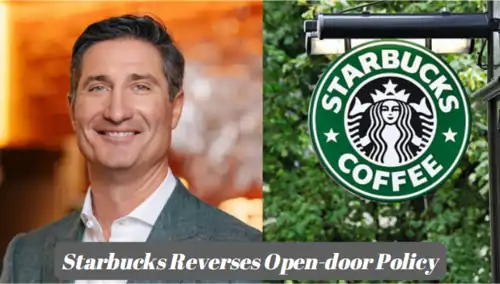
Starbucks has officially reversed its open-door policy, requiring customers to make a purchase if they wish to use restrooms or spend time in its North American stores. This policy shift is part of the company’s broader effort to refine its in-store experience and prioritize paying customers, amidst growing concerns about safety and operational challenges.
New Code of Conduct Introduced
As part of this policy update, Starbucks has introduced a comprehensive new code of conduct, which will be prominently displayed in all company-owned stores across North America. The code sets clear guidelines, including the prohibition of:
- Discrimination and harassment
- Consumption of outside alcohol
- Smoking, vaping, and drug use
- Panhandling on store premises
Jaci Anderson, a Starbucks spokesperson, explained the rationale behind these changes: “We want everyone to feel welcome and comfortable in our stores. By setting clear expectations for behavior and use of our spaces, we can create a better environment for everyone,” Anderson said in a statement to the Associated Press.
The policy also warns that individuals who violate these rules will be asked to leave, and law enforcement may be involved if necessary. To ensure the smooth implementation of these changes, Starbucks employees will undergo specialized training.
A Divisive Response
Criticism of the New Policy
The announcement has sparked a mixed reaction online. Critics argue the policy is exclusionary and could negatively impact Starbucks’ reputation as a community-oriented coffeehouse. One commenter voiced their frustration, saying, “This is an absolutely terrible and greedy decision to make. People used to go in there all the time to just study. Starbucks, you are already on thin ice. Way to put yourself on thinner.”
Others questioned the practicality of enforcing the rules. “They don’t pay baristas enough to make them pay attention and enforce this,” said one user on X (formerly Twitter).
Support for the Change
Conversely, many customers and business analysts have supported the decision, viewing it as a logical step for maintaining a functional and profitable business. “Most predictable decision ever. You can’t run a business by supplying free internet to non-customers who occupy tables meant for actual customers,” commented Joe 2.0 (@joe4deadcat) on X.
Context Behind the Policy Shift
Starbucks’ decision to implement its original open-door policy in 2018 followed a widely publicized incident in Philadelphia, where two Black men were arrested for sitting in a store without making a purchase. The incident, captured on video, sparked outrage and led to accusations of racial discrimination, prompting the company to adopt an inclusive approach.
However, the open-door policy has faced challenges over the years. Starbucks employees have reported incidents of unruly behavior, including drug use, that jeopardized staff and customer safety. In 2022, these issues prompted Starbucks to close 16 locations, including stores in major cities like Los Angeles and Seattle.
A Strategic Move for Business Growth
The policy change comes amid efforts by Starbucks’ new chairman and CEO, Brian Niccol, to rejuvenate the company’s declining sales and restore its image as a welcoming community hub. Niccol’s strategy emphasizes creating a balanced environment where paying customers can enjoy a positive experience without disruptions caused by non-paying visitors.
The decision marks a significant shift in Starbucks’ approach, highlighting the challenges of balancing inclusivity with operational efficiency. Time will tell whether the new rules will strengthen the brand’s position or further ignite debates about its role in fostering community spaces.
Disclaimer
The information provided in this article is for general informational purposes only and does not constitute professional, legal, or business advice. While every effort has been made to ensure the accuracy and reliability of the information at the time of publication, Starbucks’ policies and related developments may be subject to change. Readers are encouraged to verify any details directly with official Starbucks sources or through trusted news outlets.
The opinions quoted in this article are those of the individuals cited and do not necessarily reflect the views or opinions of this publication. The article is intended to provide a balanced overview of the topic and is not an endorsement or critique of Starbucks’ policies or business practices.
This publication is not responsible for any errors, omissions, or outcomes arising from the use of this information. For specific concerns or inquiries, please consult appropriate professionals or official representatives.








